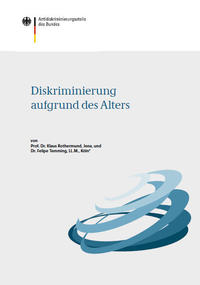Discrimination
on grounds of age
- Factsheet on the research project -
Authors: Professor Dr Klaus Rothermund, Dr Felipe Temming, LL.M., published by the Federal Anti-Discrimination Agency (FADA) Year of publication: 2010
Brief overview
The expert opinion examines the legal consequences associated with the ban on age discrimination – in particular in labour law. Moreover, the current state of research into age discrimination is discussed from the point of view of social psychology. The expert opinion aims at describing the opportunities and advantages of the prohibition of discrimination in an ageing society.
Main results
Considerable differences in the treatment of older and younger persons
The evaluation of the current state of research shows that there are partly considerable differences in the treatment of older and younger persons in the fields of labour, health and nursing, living, finances and insurances. Also the legal system includes many regulations referring to age. The majority of persons who are affected by discrimination are older people. However, in some contexts also younger persons are discriminated against.
Age discrimination leads to substantial, social and personal disadvantages.
Appreciable impact on the German labour law
The ban on age discrimination is a relatively new and special principle of non-discrimination in the European judicial area. It is a human right and it has an appreciable impact on the German labour law, which includes regulations that foster age discrimination and are partially conflicting.
As a rule, belonging to a certain age group should no longer be a prerequisite in legal standards.
More specifically:
- A desired age should no longer be mentioned in job advertisements. Furthermore, maximum age limits for being employed can still be justified in very rare cases only. However, it is generally admissible to focus on the applicants’ professional experience.
- Rules governing the payment, legal and collectively agreed periods of notice or life tenure clauses should no longer be associated with a certain age group. The decisive criterion is the length of service with a company and no longer the age group.
- According to the view of the authors of this expert opinion, the social criteria for dismissal, as stipulated in Section 1 subsection (3) first sentence of the Act on Protection Against Dismissal could infringe the ban on age discrimination. The proximity to retirement age and entitlement to receive a pension as criteria that are not mentioned officially should no longer be evaluated to the detriment of older employees. The explicitly mentioned social aspect of a person’s age group is not suitable for illustrating a higher risk to long-term unemployment.
- The authors also intensely discuss the statutory retirement age of 65 years. According to them, this age limit in its general and inflexible form is no longer conceivable.
As a less severe measure, flexible solutions are considered, as for example the scheme where employees have to present their comments on their continued employment one year before attaining the statutory retirement age and the employer may counter the employee’s demand with (urgent) reasons of a well-balanced staff structure at the company and/or insufficient aptitude. For only a minority of employees retire immediately after their active employment requiring compulsory social insurance payments. Merely for a few particular occupational groups, for instance pilots, inflexible age limits would be upheld in future. - The entire efficiency of the ban on age discrimination depends on the future court rulings in the respective cases. The judges should review the respectively implemented measures, for example dismissals, as to their proportionality.
Options for action
To overcome age discrimination, comprehensive measures are required. In general, the legislator should strive for regulations that are equally applicable to all age groups.
Not only legal provisions are important, but in addition, also
- the establishment of focal points for persons affected by age discrimination,
- the development of intra-company guidelines adapted to the needs of all age groups,
- Programmes for the creation of a positive work environment for all age groups in organisations,
- The creation of working groups comprising staff from different age groups and a work environment that meets the needs of older employees,
- The preservation of employability of older staff members by education and continuing training,
- Raising the awareness of conduct which is fair and adapted to the respective age group,
- The reform of age-discriminating provisions in contracts of employment and collective agreements.

